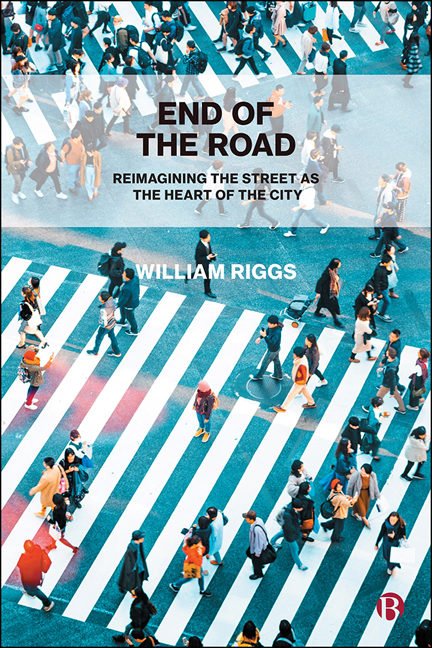Book contents
- Frontmatter
- Dedication
- Contents
- List of Figures and Tables
- Acknowledgments
- 1 Introduction
- 2 A Recent History of the Street
- 3 The Street for Transport
- 4 The Street as Economic Space
- 5 The Street as Social Space
- 6 The Street as Cultural Space
- 7 The Street as a Natural Space
- 8 Challenges to Ending the Road
- 9 Beyond Streets: Integrating Behavior
- 10 A Window into the Future: New Vehicles, New Streets
- 11 A Call to Action: Streets as the Heart of the City
- Appendix
- Notes
- References
- Index
6 - The Street as Cultural Space
Published online by Cambridge University Press: 12 October 2022
- Frontmatter
- Dedication
- Contents
- List of Figures and Tables
- Acknowledgments
- 1 Introduction
- 2 A Recent History of the Street
- 3 The Street for Transport
- 4 The Street as Economic Space
- 5 The Street as Social Space
- 6 The Street as Cultural Space
- 7 The Street as a Natural Space
- 8 Challenges to Ending the Road
- 9 Beyond Streets: Integrating Behavior
- 10 A Window into the Future: New Vehicles, New Streets
- 11 A Call to Action: Streets as the Heart of the City
- Appendix
- Notes
- References
- Index
Summary
Let me live in a house by the side of the road
Where the race of men go by —
The men who are good and the men who are bad,
As good and as bad as I.
I would not sit in the scorner’s seat
Nor hurl the cynic’s ban; —
Let me live in a house by the side of the road
And be a friend to man. (Foss, 1897, p 11)
In the previous chapters I’ve discussed many ways that we can create more environmentally, economically and socially sustainable streets, but I believe streets can also be a cultural space. They can create culture. They can facilitate activities and cultural capital that form the “glue” or cohesion of communities that people think makes them durable and resilient in the face of challenges. If you’re skeptical, consider the last time you saw kids playing in the street in front of your home. They are forging life-long memories and social bonds that will last a lifetime. They are with other children who may be of different races or economic backgrounds. Or consider the last time you went to a house with a front porch facing a neighborhood street, where people were passing by or were interacting with the street. They may have been exercising or going to and from work and have offered a wave, a smile or nod. These simple interactions and gestures are small things that create culture and one-ness of community.
This idea of the front porch has special significance in my mind. The front porch was one of the defining features of my great grandmother’s home in the hills of Kentucky. It was a space that provided a place for cultural experience and engagement. This was where they would sit on rocking chairs, talk to neighbors and watch “the race of men go by,” just as the quote from Sam Walter Foss’ poem suggests. And this is one of things that built a street that creates (and supports) culture— where a porch on the front of the house can be a catalyst for watching, engaging in and experiencing the road in front of it.
- Type
- Chapter
- Information
- End of the RoadReimagining the Street as the Heart of the City, pp. 80 - 88Publisher: Bristol University PressPrint publication year: 2022



